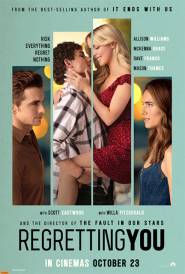Jake Gyllenhaal Stronger
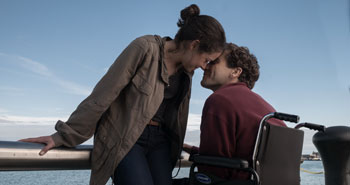
Jake Gyllenhaal Stronger
Cast: Jake Gyllenhaal, Miranda Richardson, Tatiana Maslany, Clancy Brown
Director: David Gordon Green
Genre: Drama
Rated: MA15+
Running Time: 119 minutes
Synopsis: One man becomes a symbol of hope and determination for a wounded city in Stronger, a deeply personal account of the infamous 2013 Boston Marathon bombing and its aftermath. Based on Jeff Bauman's New York Times bestselling memoir, the film celebrates his unrelenting courage against unimaginable odds.
Stronger is the inspiring true story of Jeff Bauman (Jake Gyllenhaal), an ordinary man who captured the hearts of his city and the world to become a symbol of hope. Jeff, a 27-year-old working-class Boston man, was at the marathon to try and win back his ex-girlfriend Erin (Tatiana Maslany). Waiting for her at the finish line when the blast occurs, he loses both his legs in the attack. After regaining consciousness in the hospital, Jeff is able to help law enforcement identify one of the bombers, but his own battle has just begun. He tackles months of physical and emotional rehabilitation with the unwavering support of Erin and his family. It is Jeff's intimate account of the heroic journey that tests a family's bond, defines a community's pride and inspires his inner courage to overcome devastating adversity. Filled with raw emotion, humanity and humor, Stronger pays tribute to the man who became the living embodiment of 'Boston Strong."
Stronger
Release Date: October 19th, 2017
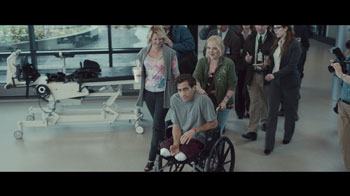 About The Production
About The Production
Standing at the finish line of the 2013 Boston Marathon, Jeff Bauman had no intention of becoming a hero. But when a pair of improvised bombs exploded next to him, his life changed instantly. A passing photographer snapped a photo of the horrifying moment Jeff was rushed off the street. His lower right leg was gone. His lower left leg was stripped to the bone. That image went viral and Jeff suddenly became the face of a horrendous tragedy for people all over the world.
Todd Lieberman of Mandeville Films first heard Jeff's story from a colleague who urged the young man to write a memoir. The veteran producer was looking for a new script, and wanted to find something inspirational as well as entertaining. 'Stories that fill audiences with a sense of exultation were hard to come by," Lieberman says. 'Then I heard about Jeff. It was exactly what I was looking for."
But at the time, Bauman was still at the beginning of his recovery and was understandably reluctant to revisit the ordeal he was working so hard to get past. When they first spoke, Lieberman was honest about what making a movie would entail. 'I told him that his entire life was going to be opened up," he says. 'All the vulnerability and pain would be exposed. I wouldn't do a whitewashed version. It had to be authentic and honest about the trauma, the emotion and the challenges he had to face. If he was willing to go there, I wanted to go with him. If not, I would understand."
Eventually, Bauman decided to write his book, also titled Stronger, and agreed to option the film rights to Lieberman's company. The producer already had a writer in mind to turn the memoir into a compelling screenplay: John Pollono. A successful playwright, Pollono's screenwriting acumen was still largely untested, but he comes from the same corner of New England as Bauman. Raised in Londonderry, New Hampshire, Pollono had experienced the physical, cultural and emotional terrain of Jeff's world firsthand and written about life there with gritty sensitivity and ironic humor in his plays.
Pollono immediately connected with the material, and with Jeff and his family. 'I know them," he explains. 'They're like my family. I don't know how anyone who didn't come from that kind of neighborhood could have written
this story. I felt a strong obligation to get this right. It was heart wrenching, but I had to do it." As he prepared his pitch for the film, Pollono discovered there was far more to Jeff's story than what was in his book. Family dynamics, fundamental beliefs about what makes a man a man, and an unwavering sense of loyalty were essential to understanding him and his world. 'The book had so much beautiful stuff in it," Pollono says. 'The more I dug into the story, the more tidbits I learned that filled it out as a movie. I loved that it was the story of an everyman who worked in the deli department at Costco. . He wasn't an athlete. Jeff Bauman happened to be in the wrong place at the wrong time. Suddenly, he had to literally and figuratively get back on his feet. It made me ask myself how I would have dealt with this if it had happened to me.
After reading Pollono's first draft, Lieberman knew he had made the right choice. 'John delivered a script that was exceptional," he says. 'The dialogue was so authentic and so beautiful. It was beyond what we expected. He had found a way to seamlessly intertwine the tragedy and Jeff's ability to find humor in his situation. And that's exactly what we wanted. It ended up being No. 2 on the Hollywood Blacklist that year."
Pollono continued to polish his screenplay for months, speaking with Bauman as often as possible. Hours on the phone helped break down Bauman's natural reserve as the writer learned more about his life, before and after the bombing. 'I also spent a lot of time speaking to the people around him," says the writer. 'He was still in the middle of all this at the time. Jeff's come a long way, but he suffers from PTSD. He was still deep in that struggle, but he's turned the corner now."
Pollono is quick to point out that this is not a film about terrorism. It is the story of one man and what he has to overcome to get his life back on track. 'We had to figure out how someone finds purpose in the middle of that without making it all dark and depressing," he explains. 'There's a tendency toward gallows humor that runs deep in Boston and all over New England. We're fighters and proud of it, so it had to have the kind of raw humor typical of the area."
Pulling Together the Team
Finding a director who could make the most of the screenplay's delicate balance of hope and despair was the next considerable hurdle. 'That was challenging," says Lieberman. 'It's an extremely dramatic story, but we had to build in release valves along the way so it isn't overwhelming. That required someone who understood that sometimes the best way to get through tragedy is with humor. That's very authentic to the way Jeff and his friends and family deal with each other. There's lots of wisecracking to get through trying times."
Director David Gordon Green has a reputation for unparalleled versatility, turning out films ranging from the outrageous stoner comedy Pineapple Express to the award-winning teen drama George Washington. Lieberman thought he would be perfect for this project. But after working on a string of movies that dealt with serious subject matter, Green was hoping to turn his attention back to comedy. 'I was looking to let loose a little bit," he remembers. 'Then I got a copy of this script. I was immediately swept away by the characters and the circumstances. I could see how the tension combined with the humorous aspects of John's script would take it beyond the headlines."
The final details fell into place when a call came out of the blue from Jake Gyllenhaal, saying he was interested in playing Bauman. He was also interested in producing the film, which would become the first release from his newly formed production company, Nine Stories Productions.
'I really loved the character and I was deeply moved by the script," says the acclaimed actor. 'It felt important to champion it. I wanted to make sure the movie got made. I was struck by Jeff's journey and the fact that this isn't a story about the bombing. It is a story about one human being moving through tragedy to hope."
With their star in place, the filmmakers all headed to Chelmsford, Massachusetts, to get to know Bauman and his world better. An unpretentious hamlet with a population of about 34,000, Chelmsford is the kind of former factory town that once served as New England's economic backbone.
'We went out for pizza and beer with a large group of people," says Green. 'We tried to keep it low key and down to earth. It helped us build real relationships with the people who knew the story best. We got mai tais with Jeff's real-life best friends Big D and Sully at the Hong Kong, the restaurant in the movie. We were trying to get the flavor of their life. I was amazed by how open and welcoming they were, considering that a bunch of strangers knocked on their doors and said, hey, tell me everything."
Green recalls being on hand for a particularly moving and personal moment in the Baumans' life. 'We were with Jeff's daughter when she was taking her first steps," says the director. 'It was touching seeing this guy who is still learning to walk himself and here he is with his kid taking her first steps."
Once filming was underway, Bauman continued to be a major resource for the production. Although he declined to visit the set, he was always available to provide personal insights and he received regular updates from the filmmakers, according to Lieberman. 'John was always trying to add more of the life and authenticity of Jeff and his family," says the producer. 'Jeff liked the idea of his story getting out, but he didn't want to relive it. I can't imagine how difficult this has been for all of them."
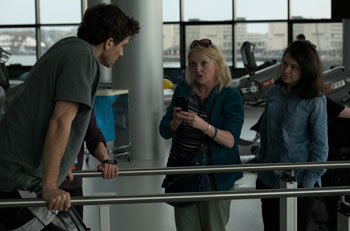 Finding Jeff Bauman
Finding Jeff Bauman
For Jake Gyllenhaal, finding the essence of his character turned out to be a lengthy and meticulous process. The actor was determined to pay tribute to Bauman's extraordinary perseverance without losing his humanity and vulnerability, but Bauman's innate stoicism sometimes made that difficult. 'There's definitely an attitude among Bostonians, particularly the men, to hold things close to the vest," says Gyllenhaal. 'To try and get Jeff to talk about his feelings was difficult. It wasn't like he was hiding anything. It is just his natural state. So I had to find nonverbal clues in his rhythms or his approach to certain problems."
The two met a number of times before and during production. 'I spent a lot of time talking with him beforehand," Gyllenhaal explains. 'Once we began shooting, I still texted with him and talked with him, just not on set. There's a part of him that is very boyish still. That's why it's so easy to fall for him. We all did. He's not only charismatic but he's so loving. He has a childlike sense of play. And, then at the same time, there's a deep darkness underneath."
Throughout much of the movie, Bauman is relearning to walk, but by the time Gyllenhaal met him, he was completely mobile thanks to the sophisticated prosthetic legs that were fabricated for him. 'I found great clues to who Jeff is in his physicality," the actor says. 'Some psychological aspects of Jeff seem connected to his rhythms, his approach to his sentences and how he approaches people. His body language and particularly the sense of humor, which I think he depends on even in his darkest times, were very helpful."
Spending time with the close-knit Bauman clan was also helpful, Gyllenhaal says. 'They are an incredibly connected, very strong group of people. It was inspiring to see how much they are there for each other. There's not a day that goes by that Jeff doesn't see or talk to his family."
Gyllenhaal deftly captures all of Bauman's contradictions without ever resorting to mimicry, according to Lieberman. 'Jake is one of the most versatile actors of his generation," says the producer. 'He's lovable and vulnerable, but also capable of going to dark places. As Jake plays Jeff, he is a little bit life of the party, a little bit arrested development. He not only shifts easily between happiness and sadness, but he came to understand what it meant to have lost two legs above the knee. He spent an extraordinary amount of time with Jeff and other double amputees learning how to move realistically. Jake was 100 percent there at all times."
Gyllenhaal's enthusiasm and commitment set the tone for everyone on set. He never backed away from anything, no matter how difficult it was. Jake really got into the head of someone who went through a heart-breaking experience. The pain Jeff was experiencing is brought out in a nuanced performance by Jake who found it through his eyes and his facial expressions. It was pretty amazing."
The actor says he often found himself wondering what he would have done in Jeff's situation. 'No matter how hard I tried to understand what he went through, I sometimes felt I was hitting a wall. I literally don't think I would have survived what he has gone through."
The Bauman Family Dynamic
To play Erin Hurley, the ex-girlfriend Bauman was waiting for at the finish line and would eventually marry, the filmmakers cast a wide net, seeing a host of talented actresses. They eventually cast Tatiana Maslany, the star of the science-fiction thriller series 'Orphan Black," who earned an Emmy Award for her multiple roles as cloned 'sisters" with vastly different personalities, accents and looks.
'Tatiana's work on -Orphan Black' made it clear that she could play a multifaceted character and not just the -love interest,'" says Lieberman. 'She is enormously sympathetic, even at moments when she is not entirely likable, which makes the character complex and realistic."
According to Green, Maslany won the role because of her vulnerable but steely take on the character as well as the instant chemistry she had with Gyllenhaal. 'I was familiar with her name, but not her work," says the director. 'After her audition, I watched all of -Orphan Black.' She is able to flip into a character's skin, try on their clothes and inhabit that. On the show, she created nuanced portraits of so many characters and I believed all of them. In this film, she was not going to just be arm candy or the cute girl that got away. Erin had to be strong and brave, whether she's comforting Jeff or really pushing him or motivating him."
Maslany was impressed by the script's portrayal of the characters as humanly ambivalent, as anyone caught up in a life-changing act of violence would be. 'The script was really beautifully written," she says. 'It didn't glorify anybody. It was about human beings going through a tragedy at a really personal level and how that affects everybody within the circle. I was really grateful to get to do this kind of work. The parts I play in -Orphan Black' are flashier, which is actually safer. This was really a challenge for me as an actor, which gave me great joy."
The Erin that audiences will meet in the film is Maslany's interpretation of the real Erin Hurley rather than an imitation of the real person, she cautions. 'I spent a lot of time learning about her experiences and finding common ground between us," she says. 'That influenced the performance on a subconscious level, but I never made a choice to emulate her. I did start running as soon as I got the part. I respect somebody who's able to run a marathon. I went from not being able to deal with running a block down the street to running nine miles and that was an exciting thing."
Although the actress spoke with Green at length about her character before shooting, there was a great deal to be discovered on set. 'Erin was flying by the seat of her pants and sometimes so was I," she says. 'Her life is turned upside down as much as anyone's, so there's a lot of reaction in her behavior. Premeditation wasn't an option for her and it wasn't what I was going for. David allowed for a lot of exploration and spontaneity."
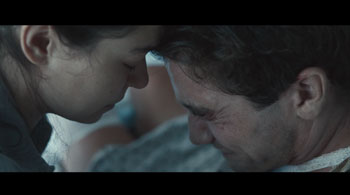 If Erin serves as Jeff's right hand through his ordeal, then his mother Patty could be his left. A tough, determined and fiercely loving parent, Patty never lets up as she pushes her son toward recovery. British actress Miranda Richardson might seem an unlikely choice for the hardcharging Bostonian, but Gyllenhaal lobbied hard for her. The resulting performance is unexpected and astonishing as she disappears into a complicated and conflicted woman.
If Erin serves as Jeff's right hand through his ordeal, then his mother Patty could be his left. A tough, determined and fiercely loving parent, Patty never lets up as she pushes her son toward recovery. British actress Miranda Richardson might seem an unlikely choice for the hardcharging Bostonian, but Gyllenhaal lobbied hard for her. The resulting performance is unexpected and astonishing as she disappears into a complicated and conflicted woman.
'Miranda was so prepared and focused and defiant in a beautiful way," Gyllenhaal says. 'She captures the love between Jeff and his mother, but also sort of a beautiful, ferocious anger. You can't really break Patty's wall. It was a wonderful game to play with her scene to scene. And it was an honor to work with her."
A longtime fan of Richardson, Green admits he would not have thought of her for the role, but knew she would be right as soon as Gyllenhaal brought up her name. 'We were looking for someone who could be surprisingly funny as well as dramatic," he says. 'I remember seeing Miranda in Louis Malle's Damage going toe to toe with Jeremy Irons and then hosting -SNL.' She can be very intense, like she was in The Crying Game and then do something charming and a little absurd, like Enchanted April."
Stepping away from the cultured, upper crust ladies she often plays was very attractive to the actress. 'I saw a character I didn't feel that I'd tackled before," says Richardson. 'And I liked the idea of getting involved with a family dynamic. I'm always attracted to things that are outside my comfort zone. Hopefully I learn something from that. It's a little bit frightening, which is also good."
Richardson had to shed some of her English rose glamor to play the salt-of-the- earth Chelmsford matriarch. 'It was almost as if we were creating a new face for her," says Lieberman. She was willing to go as far as she could, which was awesome."
In addition to a physical transformation that downplays her beauty, she had to navigate the tricky Boston accent. To accomplish that, Richardson and the film's other actors worked with one of Hollywood's premier dialect coaches, Tim Monich. 'He can do no wrong," says the actress. 'He's the consummate professional. Whatever you need, he is always there. I like transforming and this was another layer to make yourself up with."
The actress did not meet the real Patty Joyce until filming was underway, which was fine with her. Even though the character is based on a real person, the film version of Patty is a bit of an abstraction, Richardson says. 'Patty in real life is neater and sweeter than she appears in the film. She makes a better show of keeping herself together. But I was very grateful to her for giving me some time to ask her a few questions."
Meeting Patty gave not only Richardson but the entire filmmaking crew another window into Jeff Bauman's world. 'Patty is full of heart and pride in her son, says Lieberman. 'She sees that the son she's loved and cared for has come through this tragedy and is making a positive impact in the world."
The finished film exceeded all of Richardson's expectations. 'I don't think any of us knew exactly what the film was going to be," she says. 'It could have gone lots of different ways. It has a restraint that I think is crucial to getting the emotional heft of the story. And it's also very humane. The people are frail, they mess up a lot and that feels quite real."
Jeff's father and Patty's ex-husband, called Big Jeff by everyone, is played by veteran actor Clancy Brown with a constant simmering anger at what has been done to his son. For Brown, learning that Big Jeff found out about his son's injuries on the news was important to understand. 'Imagine that," he says. 'Your son is in the hospital and there's this terrible photo of him spread all over the news and all over the internet. He had no other information for quite a while, just that something had gone horribly wrong."
The film brings home not just Jeff's struggle to recover, but the ways in which it affected everyone around him, Brown says. 'After the bombing, we were all aware of Jeff and the other people who were hurt or killed that day," Brown says. 'For every one of them, there is a whole extended family that has also been hurt by seeing loved ones maimed so senselessly."
The film's supporting cast is filled with an eclectic mix of seasoned Hollywood professionals, Boston-based actors and absolute novices. Performers from the area include wellknown Boston comic Lenny Clarke as Jeff's Uncle Bob, Patty O'Neil as his Aunt Jen, Danny McCarthy as his boss Kevin and Richard Lane Jr. and Nate Richman as his buddies Sully and Big D. According to Lieberman, the locals lend the film crucial authenticity. The filmmakers even asked some of the pillars of Jeff's recovery to play themselves.
'Dr. Kalish, who was Jeff's real doctor, provides the voice you hear when his bandages are first taken off," Lieberman says. 'We also use one of the real nurses who treated him. Paul and Greg Martino of United Prosthetics, who fabricated Jeff's prosthetic legs, appear in the film and created the prostheses Jake uses."
Kalish was on set as a technical advisor, but Green had the inspired idea to have him play himself. 'That's not a scripted scene," he says. 'Having the doctor there or the Martino brothers, who own United Prosthetics, adds unexpected reality to it. If John or I had attempted to write those scenes, we'd have no way of knowing if we were right or wrong. This way, we have it in their own words."
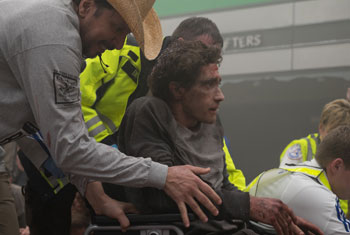 Boston Strong
Boston Strong
Shot entirely in the greater Boston area, Stronger captures the unique atmosphere and culture of the region's working people without sentimentalizing or idealizing them, says Green. 'John did an extraordinary job of representing this world in general and this specific household," says Green. 'What sets the script apart for me is a homegrown feeling and a rawness. We tried to complement that with the cinematography, production design and performances."
Getting the city and the people of Boston involved in telling this story was a priority says Lieberman. Part of that involved using practical locations as often as possible. Many of the sites where real-life events took place figure prominently in the film, including the Spaulding Rehab Center, where Jeff was treated, and United Prosthetics, where his legs were designed and constructed.
Letting the people of Boston know beforehand what kind of movie they were making was an important factor in building support for the project. The filmmakers made a point of sitting down with Mayor Marty Walsh and his chief of staff, the people who run the pro sports teams and the marathon, and various university heads so they could understand what was going to happen. An effort was also made to employ as many locals as was practical, says Stern. 'Actually almost 80 percent of our cast was from Boston. It was very important for us to let Bostonians help tell the story."
Production designer Stephen Carter points out that practical locations come with a certain unpredictability that requires a willingness to be flexible. 'We had to be nimble," he says. 'But David embraces surprises and gravitates towards the unexpected."
One of the few settings created from scratch is the marathon finish line. Rather than using sweeping views of the crowded streets, Carter chose to replicate about 120 feet of city streets, sidewalks and storefronts for a birds-eye view of the explosion. 'We wanted to keep it very personal and very much what Jeff would have gone through," the designer says.
The marathon scenes were extremely challenging, according to Maslany. The race is an annual ritual for Bostonians, who stand along the route, watch at home with friends and gather at their favorite bars. 'It was very soon to be telling this story," she says. 'It's still very fresh and the marathon was happening while we were there. To be on the street and running with extras who were all from Boston was so moving. I can't imagine how they must have felt, but I'm so grateful to them for that commitment."
Boston turned out in a huge show of support for Bauman. Filming took place at Fenway Park, where Jeff was asked to throw out the first ball of the season. The Boston Bruins allowed the production company to shoot on the ice at the TD Garden to recreate a milestone moment in which Bauman makes an appearance during a hockey game. After a real-life game, 5,000 Bruins fans agreed to stay in their seats and serve as extras. 'The cheering and the love and the passion they showed felt so real," says Pollono. 'I think that until then their support seemed a little abstract for Jake, but you could see he got it that night. I think it helped define his performance in some ways."
According to executive producer Riva Marker, Gyllenhaal's partner in Nine Stories, each of the department heads on the film was chosen for their storytelling ability. 'Jake and I started Nine Stories to be a home for storytellers and filmmakers. We're most excited to work with people who have that vision. Dylan Tichenor, our editor, is very thoughtful and thorough in selecting each of the shots. Stephen Carter, the production designer, is a premier visual storyteller, as are Kim Wilcox and Leah Katznelson, who did the costume design. And of, course, we have Sean Bobbitt."
Cinematographer Sean Bobbitt began his film career as a documentarian and prefers to operate the camera himself. 'It keeps me absolutely engaged with the performances of the actors," he says. 'It also allows me to compose shots as I work. And in my mind, composition is half of cinematography."
For Green that meant he had the freedom to shoot group scenes in the naturalistic style he was looking for. 'Sean claims that the most striking and memorable images of his career have never been designed," says the director. 'They've been found. So we set a stage, let the actors find where they went naturally and it was our job to follow them. His philosophy was not to bring any lights onto set. There would be lights outside the room or outside the windows, but I don't think there was ever a light stand in an environment that we were filming."
The resulting scenes have the hectic, in-the-moment feeling of a real family gathering. 'There was never a shot list or a storyboard for these scenes," Green says. 'Sean would be in there with one or two cameras and we'd just explain the intention of the scene to the actors and see how it went. We were going for reality and in some cases for heightened reality. It is a true story after all and we were trying to ensure that it was as real and convincing as possible."
The story's blue-collar Massachusetts setting was a new world for Bobbitt, who became familiar with his surroundings by spending time with Bauman and his friends. 'There were so many quirky, incongruous elements all around," he says. 'I picked up on the recurring visual elements and tried to re-create the fascinating world of contradictions. It seemed like everywhere there were Chinese restaurants that had a Tiki bar and these splashes of brilliant colors. It was nothing like I'd ever seen before."
The complex visual effects required to recreate Jeff's injuries are deliberately presented in a way that is raw, stripped down and unglamorous. 'We let the fantastic work that the visual effects people did of removing Jeff's legs for the film stand on its own," says Green. 'Sean shot it in a way that looks a little grainy and underexposed. It was shot on the fly without any razzledazzle."
Makeup artist Donald Mowat, who worked with Gyllenhaal on Nightcrawler and Nocturnal Animals, designed makeup that helped create a very sophisticated illusion. He compares putting it all together with trying to assemble a piece of furniture from IKEA. 'Would it all go together once we got there? There were so many elements to pull together. There's almost nothing comparable out there on film."
'It's an amazing mix of practical prosthetics, visual effects and a brilliant performance," adds Lieberman. 'A custom wheelchair rig worked in tandem with the special effects and then Donald Mowat designed makeup that went along with that to create a very sophisticated illusion."
Three life casts were made of Gyllenhaal's legs in different positions " standing, sitting and lying down. A special wheel chair rig was fabricated. Everything down to the color of the prosthetic stump was carefully considered. 'It would have been easy to simply make it look frightening and disgusting, but we weren't going for shock value. This is Jeff's real life and we were careful to be respectful of that."
Watching Gyllenhaal, Green and the other dig into the film was incredibly satisfying for Marker. Her partner was constantly aware of his responsibilities as both star and producer, she says. 'Jake was always thinking of the best way to tell this story. Even when he was in a scene, he was thinking about what lens was being used. Was the angle correct? Is there another shot we need or a way to make this more dynamic? And David is incredibly generous and open. 'What has made this collaboration so remarkable is that everyone has always been aware that this story is bigger than all of us. We have a responsibility to get it right."
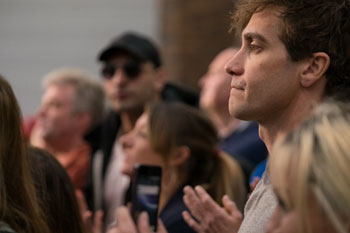 Lieberman believes that part of the reason Bauman's story captured the world's imagination is that he is a normal guy who was thrust into devastating circumstances. 'One of the central questions of the movie " and something Jeff asked himself " is why did he become a symbol for so many people?" he says. 'What does it mean to be a hero? Do you have to do something -heroic'? Or can you simply inspire others to reach deep and do things they might not think they are capable of?"
Lieberman believes that part of the reason Bauman's story captured the world's imagination is that he is a normal guy who was thrust into devastating circumstances. 'One of the central questions of the movie " and something Jeff asked himself " is why did he become a symbol for so many people?" he says. 'What does it mean to be a hero? Do you have to do something -heroic'? Or can you simply inspire others to reach deep and do things they might not think they are capable of?"
Although Jeff Bauman's story is extreme, Green believes there is something universal in his experience. 'The challenge of this movie for me was to make something that feels absolutely real and raw. It stays respectful to the truth, but is not a re-enactment. I want audiences to feel like they've dropped into these characters' lives and to fall in love with them. I think people will be inspired by Jeff's complex journey and the incredible love and support he received from Erin, his family and friends, and the people of Boston. And if they look at it and realise that they can turn to the people who care about them when tragedy, or even disappointment, strikes in their lives, that will make me happy."
Stronger
Release Date: October 19th, 2017
MORE




